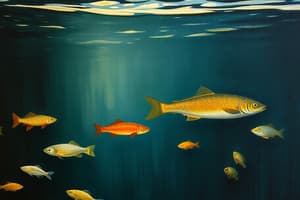Podcast
Questions and Answers
Which level of organization comes after a population in ecological studies?
Which level of organization comes after a population in ecological studies?
- Biosphere
- Ecosystem
- Organism
- Community (correct)
What type of organisms rely directly on other organisms for their energy?
What type of organisms rely directly on other organisms for their energy?
- Detrivores
- Autotrophs
- Heterotrophs (correct)
- Herbivores
Which of the following is an example of a biotic factor in an ecosystem?
Which of the following is an example of a biotic factor in an ecosystem?
- Light
- Soil
- Plants (correct)
- Temperature
In a food chain, which level typically represents herbivores?
In a food chain, which level typically represents herbivores?
What do plants primarily absorb from the environment to carry out photosynthesis?
What do plants primarily absorb from the environment to carry out photosynthesis?
Which of the following describes mutualism in ecological interactions?
Which of the following describes mutualism in ecological interactions?
What occurs during primary succession?
What occurs during primary succession?
Which process contributes to the movement of phosphorus through soil and water?
Which process contributes to the movement of phosphorus through soil and water?
Flashcards
Ecology
Ecology
The study of how living things interact with each other and their environment.
Abiotic Factors
Abiotic Factors
Non-living parts of an environment.
Biotic Factors
Biotic Factors
Living organisms in an environment.
Heterotrophs
Heterotrophs
Signup and view all the flashcards
Food Chain
Food Chain
Signup and view all the flashcards
Trophic Level
Trophic Level
Signup and view all the flashcards
Secondary Succession
Secondary Succession
Signup and view all the flashcards
Primary Succession
Primary Succession
Signup and view all the flashcards
Study Notes
Ecology Overview
- Ecology is the study of interactions between organisms and their environment.
- Abiotic factors are non-living parts of the environment (e.g., light, temperature, soil).
- Biotic factors are all the living organisms in an environment.
- Levels of organization (from simplest to most complex): organism, population, community, ecosystem, biosphere.
- Habitat is the place an organism lives.
- Niche is an organism's role in its habitat.
Energy Flow and Food Relationships
- Autotrophs capture energy from the sun to make food.
- Heterotrophs (consumers) rely on other organisms for energy.
- Herbivores eat only plants.
- Carnivores eat animals.
- Omnivores eat both plants and animals.
- Detritivores and decomposers feed on dead matter.
- Endotherms generate their own internal heat.
- Food chains show what eats what.
- Food webs connect multiple food chains.
Ecological Succession
- Primary succession occurs when life begins in new land (e.g., volcanic rock).
- Secondary succession occurs when life returns after a disturbance (e.g., forest fire).
Biogeochemical Cycles
- Carbon cycle: Plants absorb carbon dioxide for photosynthesis; trees release oxygen during photosynthesis.
- Nitrogen cycle: Nitrogen is converted into a usable form for plants and animals. Nitrogen-fixing bacteria are examples.
- Oxygen cycle: Oxygen is cycled through respiration.
- Water cycle: Water moves through evaporation and condensation.
- Phosphorus cycle: Phosphorus moves through soil and water, absorbed by plants.
Symbiotic Relationships
- Parasitism: One organism lives on a host.
- Mutualism: Both species benefit.
- Commensalism: One species benefits, the other is not harmed.
Trophic Levels and Energy Pyramids
- Trophic levels represent feeding positions in a food chain/web.
- First trophic level—producers (autotrophs).
- Second trophic level—herbivores.
- Third trophic level—secondary consumers.
- Energy pyramid shows the flow of energy through trophic levels (smallest amount of energy at highest level).
Studying That Suits You
Use AI to generate personalized quizzes and flashcards to suit your learning preferences.
Description
This quiz covers key concepts in ecology, including the interactions between organisms and their environment. You will learn about abiotic and biotic factors, energy flow through food chains, and ecological succession. Test your understanding of these fundamental principles of ecology.




